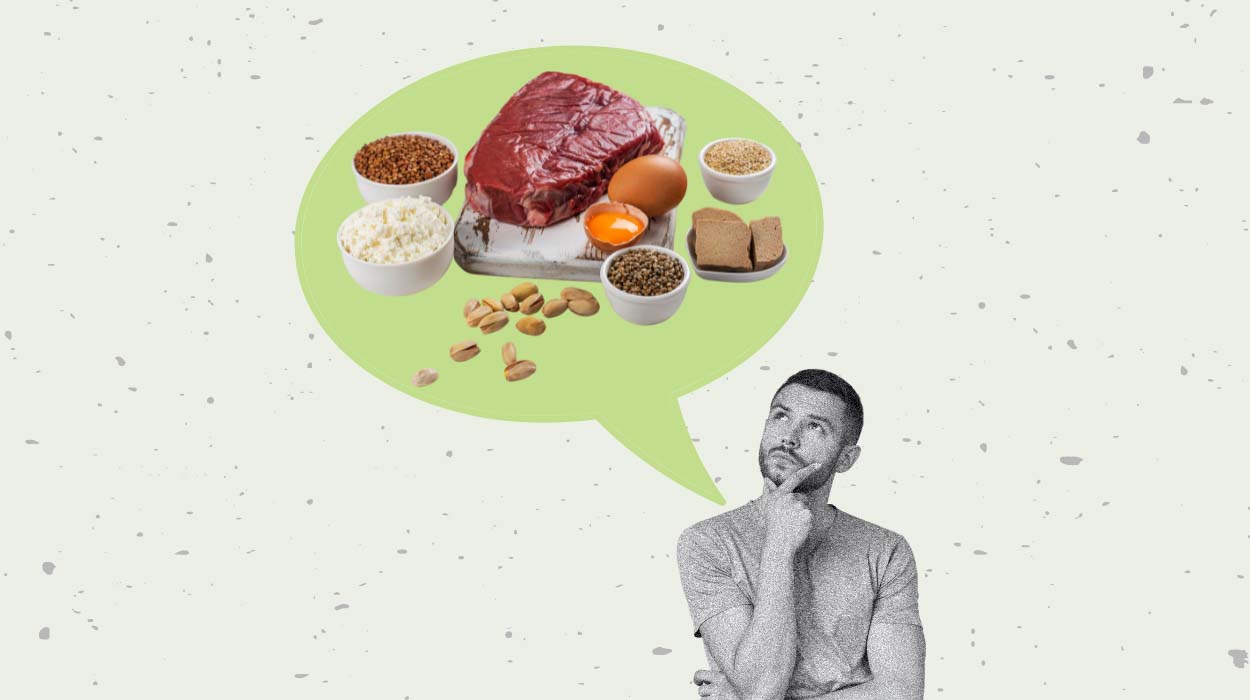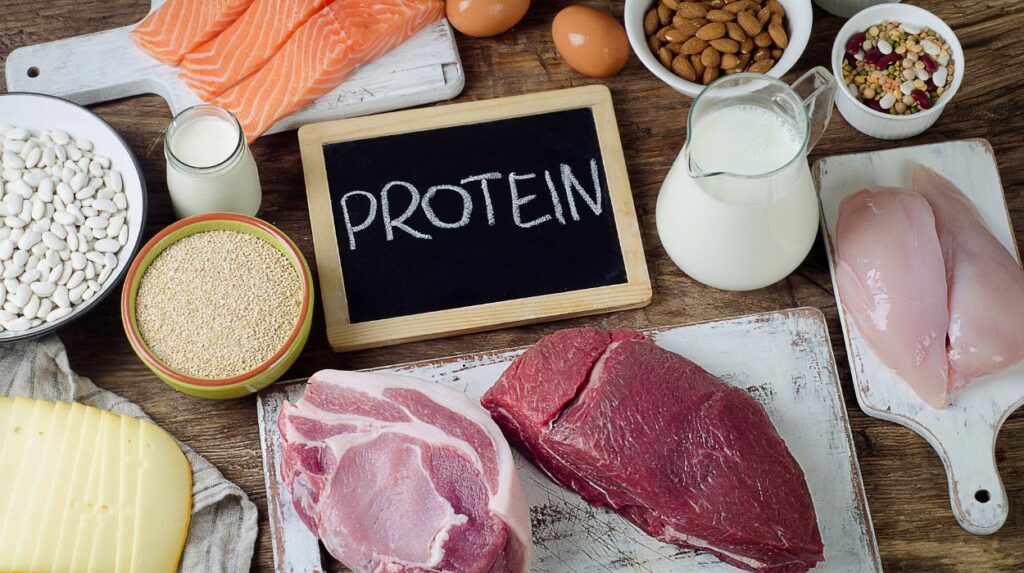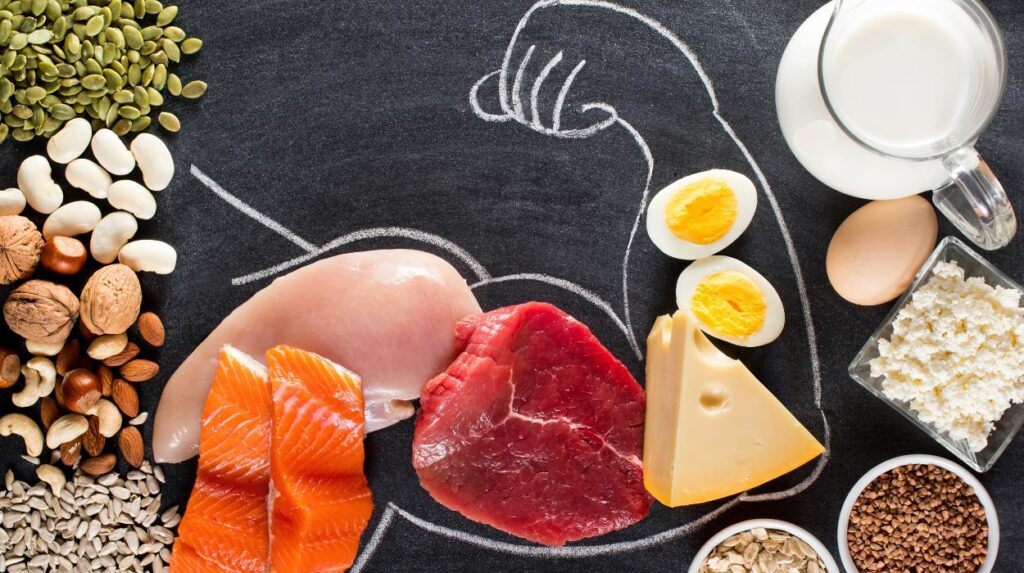
Ever heard the phrase: protein is life? The human body comprises millions of protein molecules, from your nails to your hair, skin, organs, and even your cells. Protein plays a major role in how the body functions and in producing antibodies for protection. This is why the importance of a protein-filled diet cannot be overemphasized. So how much protein do I need in a day? It depends on certain factors like age, diet, activity level, health, and goal.
Eating the right amount of protein daily is enough to cover your body’s needs. The point of including high amounts of protein in your diet is to replace body protein that has been replenished for important body functions like tissue repair, maintenance of protein of fluid balance, and general body metabolism. Here, you’ll learn the importance of a protein-filled diet and how much you need in a day. This is to make sure you are eating just the right amount to facilitate good health.
How Much Protein A Day Do You Need?
The Food and Nutrition Board of the Institutes of Medicine recommends a daily protein intake of 10%-35% of total energy intake, with 10%-30% for children.
To determine your daily protein intake, multiply your weight by 0.8 grams. For active individuals, 1.2-2.0 grams of protein per kilogram of body weight is recommended for muscle strength and power.
How Much Protein Do I Need A Day?

According to guidelines established by the Food and Nutrition Board of the Institutes of Medicine,[1] the recommended daily requirement for protein in the diet should be 10% – 35% of total energy intake and 10% – 30% for children. A good way to be sure you are eating the right amount of protein daily is by using your weight to calculate your minimum protein intake.
The average adult typically needs to consume a minimum of 0.8 grams of protein per kilogram of body weight every day. This means you can multiply your weight in kilograms by 0.8 grams to know how many grams of protein you need in a day. This means a person weighing 75 kilograms would need 60 grams of protein daily. If you are very active, you may need to increase your protein intake. Some organizations suggest that athletes require 1.2 – 2.0 grams of protein per kilogram of their body weight to help build more muscle strength and power.
What Is Protein?
Proteins are large molecules or macromolecules made up of long chains of amino acids. These amino acid chains contain hundreds or thousands of amino acids, which are smaller units. There are 20 different amino acids in nature attaching in different configurations to produce long chains combined to make a protein. A typical protein molecule is made up of 300 or more amino acids and the sequence of amino acids is unique to each protein. Our body gets its main supply of essential amino acids from the protein in our diet. This makes them necessary for the growth and maintenance of body cells and tissues. Research[2] shows that several people in the US get a lot of their dietary protein from animal sources like meat, fish, and eggs. Plant-based proteins are also a good alternative for people on a vegan diet.
Health Benefits Of Protein
There’s no doubt that protein is one of the most important food groups. However, many people take just enough to prevent protein deficiency but require a much higher excessive protein intake. Here are a few reasons why you should eat more protein.
Increases Strength And Muscle Mass

The body is made almost completely of proteins; this includes your muscles. Protein is responsible for sustaining and building lean muscle mass. The more protein in your diet, your muscle grows, and your strength increases. Several studies[3] show that an increase in dietary protein increase can maximize resistance training and help with muscle building. If you exercise a lot or are physically active, you need to eat as much protein as possible. Consuming high amounts of proteins helps prevent muscle loss and repairs muscle fast in case of injury.
Increases Metabolic And Fat Burning Activities
Metabolism is the normal body function that occurs within our body to maintain life. When you eat, the body uses excess calories from your diet to start up metabolism and distribute nutrients across the body. The increase in the rate of metabolism right after a meal is known as the thermic effect of food.
Different food groups have their thermic effects, but that of protein is much higher than carbs or fat. This means that high protein in the diet can significantly increase metabolism and calorie burning.
Reduces Appetite And Late-Night Craving
The body reacts to all the major macronutrients differently. The way the body responds to a high-carb diet is far different from that of a protein diet. Protein boosts the levels of peptide YY in circulation; this is a hormone secreted by the small intestine after eating. When released, it binds receptors in the brain to make people feel full, reducing appetite and cravings that often come after a meal.
Cravings are hard to control, and a good way to prevent overeating is to eat high-protein diets for breakfast and dinner. This effect on appetite can also contribute to weight loss. To lose body weight, take smaller portions of carbs and a few more bites of protein-rich foods like fish or lean meats.
Improves Bone Density
Proteins are great in helping your bones remain strong. The common myth that protein, specifically animal protein, is bad for your bones is due to a lack of proper knowledge of bone metabolism. Several long-term studies have proved the effect of dietary protein on skeletal health.
People who eat more protein maintain better bone density as they age and reduce the risk of osteoporosis, especially post-menopausal women. Eating a protein-filled diet is one way to ensure your bones are well taken care of.
Best Ways To Get Enough Protein
The best protein sources are typically plant-based or animal-based and are enough to help you meet your daily protein requirement. Proteins from plant foods are regarded as incomplete proteins because they lack all the essential amino acids. Including a wide variety of plant-based proteins in your diet gives your body all the amino acids required in one diet.
Here are a few ways to include more protein in your diet.
Include Different Combinations Of Plant Proteins
Different food combinations contain different amounts of essential amino acids. The majority of plant-based proteins, when eaten alone, are not enough to supply the body’s protein needs. If you follow a strict vegan diet, you need to combine several different plant proteins in one meal to give you what you need.
Some of the best sources of plant protein include:
- Legumes like peas and beans
- Nuts and nut butter
- Oats
- Chia seeds
- Quinoa
Eat More Animal Proteins
Animal foods are an excellent source of protein with high levels of important amino acids. You can improve your daily protein intake with these high-protein foods:
- Poultry
- Fish
- Eggs
- Meat
It is more advisable to choose proteins from poultry over red meat because of the high level of saturated fat present in red meat.
Include More Dairy Products
Proteins from dairy products contain high amounts of other important nutrients like vitamin D, iron, and calcium. Also, some studies suggest that consuming high amounts of dairy, like milk and yogurt, can help you lose weight and prevent overeating. Some popular dairy products are yogurt (plain or low fat), milk (whole or skimmed), and cheese.
Conclusion
Protein is highly important in every diet. The first step to a healthier life is learning how much protein you need per diet. The Food and Drug Administration recommends that adults consume up to 50 grams of protein in every 2000-calorie diet. However, a person’s specific dietary needs depend on certain factors like age and activity levels.
Frequently Asked Questions
Yes, it can but only in certain circumstances. If a person suffers from chronic kidney disease, it is advisable to stay away from a high-protein diet.
Protein is great for muscle building. Consuming the right amount of protein can build your strength.
The best food source of proteins can be obtained from poultry, fish, eggs, meat, and a combination of plants like legumes, nuts, and oats.
Yes. Eating too much proteins than needed may cause fat cells in the body.
Protein should provide 10-35% of one’s daily calorie intake.
This is false, since women require around 46 daily grams of protein and men should be getting around 56 daily grams of protein.
Complete proteins contain all the essential amino acids needed for the body.
Athletes require slightly more proteins than regular people because of their activity level.
Resources
- Manore, M.M. (2005). Exercise and the Institute of Medicine Recommendations for Nutrition. Current Sports Medicine Reports, [online] 4(4), pp.193–198. doi:https://doi.org/10.1097/01.csmr.0000306206.72186.00.
- Pasiakos, S., Agarwal, S., Lieberman, H. and Fulgoni, V. (2015). Sources and Amounts of Animal, Dairy, and Plant Protein Intake of US Adults in 2007–2010. Nutrients, [online] 7(8), pp.7058–7069. doi:https://doi.org/10.3390/nu7085322.
- Bosse, J.D. and Dixon, B.M. (2012). Dietary protein to maximize resistance training: a review and examination of protein spread and change theories. Journal of the International Society of Sports Nutrition, [online] 9(1). doi:https://doi.org/10.1186/1550-2783-9-42.




